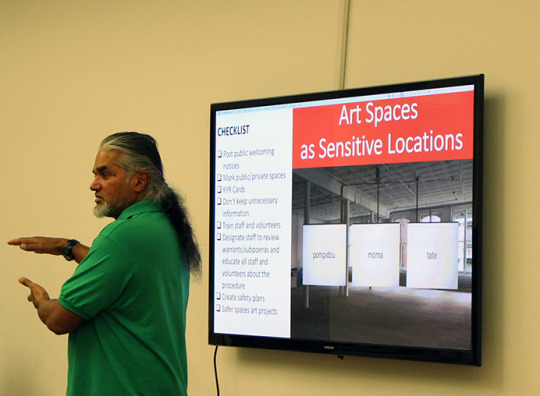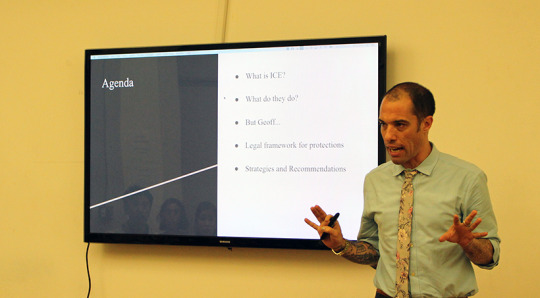Know Your Rights Sanctuary Training Essentials
Learn basic tips on how to help provide sanctuary and support to immigrant and refugee artists and colleagues.
NYFA recently held a two-hour Know Your Rights Sanctuary Training with Ravi Ragbir, director of the New Sanctuary Coalition; Abou Farman, from Art Space Sanctuary; and Geoff Kagan-Trenchard, Esq. from Anti-Violence Project. We’re distilling some of the most important takeaways and encourage you to bring the Know Your Rights Sanctuary Training to your organization. To do so, please contact Abou Farman at [email protected] and Ravi Ragbir at [email protected].
The presentation contextualized a sense of urgency for the affected communities, and the conceptual work that is necessary to understand the intersectional nature of immigration matters. Kagan-Trenchard explained and showed the difference between an administrative and judicial warrant and how to recognize if you are being given a document that has no judicial significance. He provided a reminder that cultural organizations should not be asking and recording immigration status, should avoid storing such information in their database, and must certainly not share it.
If a law enforcement officer enters your facility, there should be a designated staff member that should:
- Ask them to identify themselves (are they local police or immigration?).
- Write down the full name of the officer(s) present.
- Ask why he/she is there and request to see a warrant (if the officer lacks a warrant, respectfully ask that the officer leave your premises).
It is important to be able to recognize and document whether the warrant is administrative or judicial. Try to limit interactions with the officer to specific competent individuals in the organization (counsel or director) and contact a local immigration attorney or nonprofit to advise on the situation. The designated staff member should inform all who are present that they will directly engage with the officers and issue a reminder that everyone present has the right to remain silent.

A few key points to keep in mind before an emergency occurs:
- Don’t wait until you need friends to make them.
- Have a contact for an attorney and media rep ready.
- Don’t wait until it’s an emergency to make a plan.
- Who is the person in charge if ICE arrives at the venue, and what are they going to say?
- “You’ll need to speak with the manager” is something you can say, even if you are a manager.
- You have the right to (and should) film interactions with law enforcement/ICE. It’s a good idea to have someone on staff ready for this. Don’t obstruct while filming.
- Don’t have anything to give them.
- Minimize the amount of sensitive information you have.
- All social media is monitored. Act accordingly.
- Don’t be quiet about how you feel about them.
- A little bit of signage goes a long way. Mark private spaces clearly. That’s where the law can’t enter without a warrant.
Best practices for supporting immigrants in your organization:
- Train staff
- Post notices
- Delimit public/private spaces
- Be mindful of privacy & records
- Create a safe environment
- Don’t require ID
- Provide resources and information
Best practices for immigrants:
- Get a New York City ID (NYC ID).
- If you have valid immigration documents, show them. Always carry these with you.
- DO NOT carry papers from another country: if you have these, they can be used against you in the deportation process.
- You do not have to sign papers that you do not understand. Wait until you talk to a lawyer.
- Do not let anyone scare you into signing papers.
- By signing something, you are saying that you read and understand the document and agree with what it says.
Emergency safety plan:
- Reliable immigration lawyer’s name and number.
- Someone to take care of your loved ones (especially children, elderly, and pets).
- Arrange for your medical needs.
- Organize important documents in a safe place; make copies and make them accessible to a trusted person.
- Keep your Alien Registration Number (A-number) and birthdate in a place accessible by loved ones should they need to locate you.
Community safety plan:
- Know your rights!
- Develop a Buddy System and community self-defense:
- Create a network of friends, family, neighbors, etc.
- Put together a text tree, phone tree, noisemakers, banners, videographers, photographers, legal observers, etc.
Important resources:
- Accompaniment Training
- Websites for low-cost immigration attorneys in your area:
- List of pro-bono legal service providers in the USA
- American Immigration Lawyers Association
- Administrative Relief Resource Center
- Pro Se (Legal) Clinic
- New Sanctuary Coalition Resources Directory
- NYFA IAP Resource Directory – Immigrant Services
– Alicia Ehni, Program Officer
This post is part of the ConEdison Immigrant Artist Program Newsletter #123. Subscribe to this free monthly e-mail for artist’s features, opportunities, and events. Learn more about NYFA Immigrant Artist Mentoring Program.
Images from the Top: Geoff Kagan-Trenchard, Esq., Photo Credit: NYFA; Ravi Ragbir, Photo Credit: NYFA






